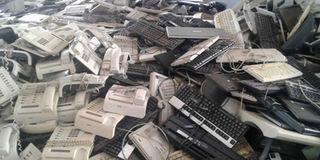Ban on imports set to curb e-waste menace

Kenya generates more than 44,000 tonnes of electronic waste (e-waste) each year contributing majorly to environmental degradation. PHOTO | FILE | NATION
Kenya generates more than 44,000 tonnes of electronic waste (e-waste) each year contributing majorly to environmental degradation.
It is for this reason that the government has announced a ban in importation of second hand electronic gadgets from January 2020.
According to a director in the Ministry of Environment Ayub Macharia, Kenya has been a dumping ground for e-waste from developed countries.
“We are putting in place strict regulations and the ban will be contained in the Extended Producer Responsibility Regulations,” said Mr Macharia. This means a fee will be charged on top of the gadget price where buyers will either get it back when they take back the product or get a new one by adding a certain amount of money.
The move is set to make the importers and sellers of electronic gadgets, which include television sets, radios, mobile phones, electric cables and equipment responsible for the waste.
“The sellers of the non-biodegradable equipment will have to adhere to a deposit return scheme,” he said.
PROPER DISPOSAL
This means that a certain fee will be charged on top of the gadget price where buyers will either get it back when they take back the product or get a new one by adding a certain amount of money.
Mr Macharia added that the regulation will be fully running by March 2020.
He accused government offices and parastatals of holding the largest consignment of e-waste in terms of TVs, fridges, and electric cables among other electronic gadgets.
According to Waste Electrical and Electronic Equipment Centre (WEEE) general manager Boniface Mbithi, Kenya generates over 44,000 tons of electronic waste each year.
The gadgets end up polluting the environment as they are not properly disposed.
“The e-waste is more because we do not have a framework to capture the data. Our institution only collects 25 tonnes monthly although we have a capacity of 100 tonnes,” he said.
Some of the firms legally licensed to recycle the e-waste include Simonet Kenya, EWIK, Sintmund and WEEE centres while Safaricom PLC and Communication Authority as collection centres.



